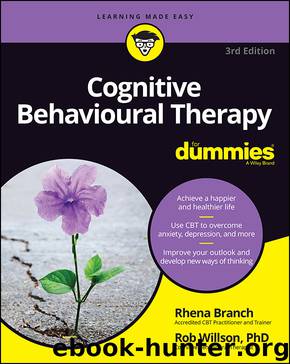Cognitive Behavioural Therapy For Dummies by Rob Willson & Rob Willson

Author:Rob Willson & Rob Willson
Language: eng
Format: epub
ISBN: 9781119601333
Publisher: Wiley
Published: 2019-11-12T00:00:00+00:00
Identifying and Understanding Obsessional Problems
Obsessional problems are among the most disabling of common emotional-behavioural problems. People with obsessional problems can spend many hours a day plagued by upsetting thoughts and feel driven to repeatedly carry out rituals or fervidly avoid certain situations.
Some degree of obsessionality is entirely normal – for example, around half of all people have a particular thing that they check more than they think is necessary, such as whether the gas cooker has been switched off or the door’s been bolted. Obsessional problems have their roots in normal experiences, but the rituals and avoidance behaviours serve to make the frequency, severity and duration of obsessions worse. The more you try to rid yourself of doubts, the more they tend to play on your mind.
We define the terms related to obsessions in this list:
An obsession is a persistent, unwanted thought, image, doubt or urge that intrudes into your mind and triggers distress. Obsessions are said to have reached a psychiatric problem level when they cause significant levels of distress, interfere with your life and are present for more than an hour a day.
Preoccupation means being absorbed with something troubling that won’t leave your mind. You feel compelled to give it your attention. Preoccupations are fueled by self doubt that reaches proportions outside of typical everyday human experience. They’re similar to obsessions in that they’re regarded as problematic when they cause significant distress, interfere with your life and last for more than an hour per day.
In this chapter, we focus on preoccupations common to OCD, like the prevalence of germs or poisons or the content of an unwanted or intrusive thought such as ‘Do I want to harm my loved one?’ or ‘Did I turn off the cooker?’ OCD and other related disorders such as BDD and IAD have preoccupation as a major defining component. See Chapters 11 and 9, respectively, for more info about these disorders.
Download
This site does not store any files on its server. We only index and link to content provided by other sites. Please contact the content providers to delete copyright contents if any and email us, we'll remove relevant links or contents immediately.
The Art of Thinking Clearly by Rolf Dobelli(8836)
Mindhunter: Inside the FBI's Elite Serial Crime Unit by John E. Douglas & Mark Olshaker(7827)
Change Your Questions, Change Your Life by Marilee Adams(6637)
Nudge - Improving Decisions about Health, Wealth, and Happiness by Thaler Sunstein(6629)
Mastermind: How to Think Like Sherlock Holmes by Maria Konnikova(6224)
The Power of Now: A Guide to Spiritual Enlightenment by Eckhart Tolle(4749)
Men In Love by Nancy Friday(4314)
Factfulness: Ten Reasons We're Wrong About the World – and Why Things Are Better Than You Think by Hans Rosling(4015)
The Confidence Code by Katty Kay(3561)
Thinking in Bets by Annie Duke(3527)
Man and His Symbols by Carl Gustav Jung(3309)
Three Women by Lisa Taddeo(2916)
The Worm at the Core by Sheldon Solomon(2910)
Why Buddhism is True by Robert Wright(2819)
Liar's Poker by Michael Lewis(2805)
The Inner Life of Animals by Peter Wohlleben(2763)
Descartes' Error by Antonio Damasio(2728)
The Power of Mindful Learning by Ellen J. Langer(2705)
The Slow Fix: Solve Problems, Work Smarter, and Live Better In a World Addicted to Speed by Carl Honore(2570)
